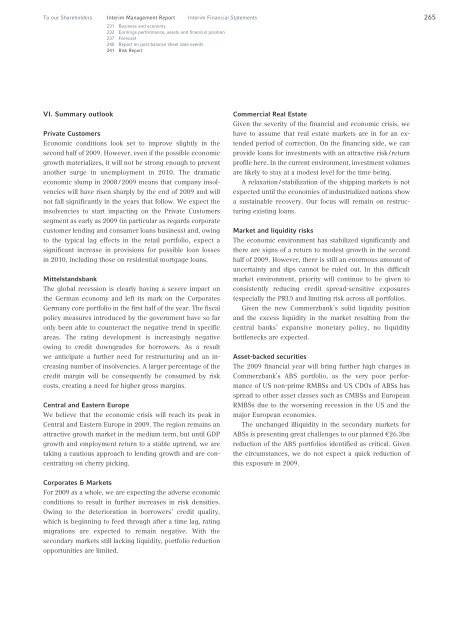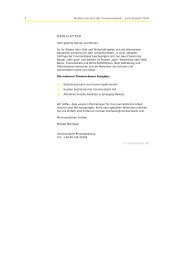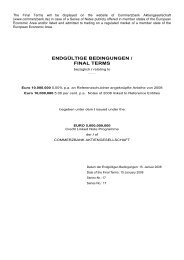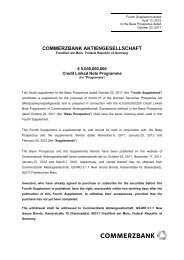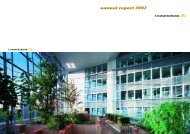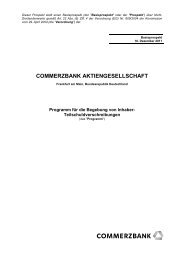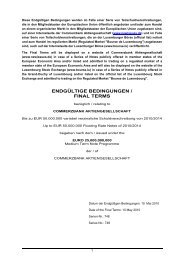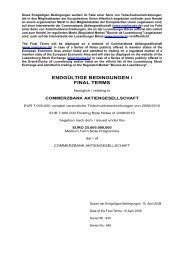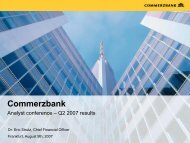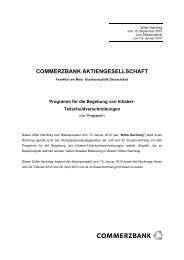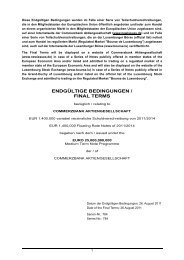COMMERZBANK AKTIENGESELLSCHAFT
COMMERZBANK AKTIENGESELLSCHAFT
COMMERZBANK AKTIENGESELLSCHAFT
Create successful ePaper yourself
Turn your PDF publications into a flip-book with our unique Google optimized e-Paper software.
To our Shareholders Interim Management Report Interim Financial Statements<br />
VI. Summary outlook<br />
231 Business and economy<br />
232 Earnings performance, assets and financial position<br />
237 Forecast<br />
240 Report on post-balance sheet date events<br />
241 Risk Report<br />
Private Customers<br />
Economic conditions look set to improve slightly in the<br />
second half of 2009. However, even if the possible economic<br />
growth materializes, it will not be strong enough to prevent<br />
another surge in unemployment in 2010. The dramatic<br />
economic slump in 2008 / 2009 means that company insolvencies<br />
will have risen sharply by the end of 2009 and will<br />
not fall significantly in the years that follow. We expect the<br />
insolvencies to start impacting on the Private Customers<br />
segment as early as 2009 (in particular as regards corporate<br />
customer lending and consumer loans business) and, owing<br />
to the typical lag effects in the retail portfolio, expect a<br />
significant increase in provisions for possible loan losses<br />
in 2010, including those on residential mortgage loans.<br />
Mittelstandsbank<br />
The global recession is clearly having a severe impact on<br />
the German economy and left its mark on the Corporates<br />
Germany core portfolio in the first half of the year. The fiscal<br />
policy measures introduced by the government have so far<br />
only been able to counteract the negative trend in specific<br />
areas. The rating development is increasingly negative<br />
owing to credit downgrades for borrowers. As a result<br />
we anticipate a further need for restructuring and an increasing<br />
number of insolvencies. A larger percentage of the<br />
credit margin will be consequently be consumed by risk<br />
costs, creating a need for higher gross margins.<br />
Central and Eastern Europe<br />
We believe that the economic crisis will reach its peak in<br />
Central and Eastern Europe in 2009. The region remains an<br />
attractive growth market in the medium term, but until GDP<br />
growth and employment return to a stable uptrend, we are<br />
taking a cautious approach to lending growth and are concentrating<br />
on cherry picking.<br />
Corporates & Markets<br />
For 2009 as a whole, we are expecting the adverse economic<br />
conditions to result in further increases in risk densities.<br />
Owing to the deterioration in borrowers’ credit quality,<br />
which is beginning to feed through after a time lag, rating<br />
migrations are expected to remain negative. With the<br />
secondary markets still lacking liquidity, portfolio reduction<br />
opportunities are limited.<br />
Commercial Real Estate<br />
Given the severity of the financial and economic crisis, we<br />
have to assume that real estate markets are in for an extended<br />
period of correction. On the financing side, we can<br />
provide loans for investments with an attractive risk /return<br />
profile here. In the current environment, investment volumes<br />
are likely to stay at a modest level for the time being.<br />
A relaxation / stabilization of the shipping markets is not<br />
expected until the economies of industrialized nations show<br />
a sustainable recovery. Our focus will remain on restructuring<br />
existing loans.<br />
Market and liquidity risks<br />
The economic environment has stabilized significantly and<br />
there are signs of a return to modest growth in the second<br />
half of 2009. However, there is still an enormous amount of<br />
uncertainty and dips cannot be ruled out. In this difficult<br />
market environment, priority will continue to be given to<br />
consistently reducing credit spread-sensitive exposures<br />
(especially the PRU) and limiting risk across all portfolios.<br />
Given the new Commerzbank’s solid liquidity position<br />
and the excess liquidity in the market resulting from the<br />
central banks’ expansive monetary policy, no liquidity<br />
bottlenecks are expected.<br />
Asset-backed securities<br />
The 2009 financial year will bring further high charges in<br />
Commerzbank’s ABS portfolio, as the very poor performance<br />
of US non-prime RMBSs and US CDOs of ABSs has<br />
spread to other asset classes such as CMBSs and European<br />
RMBSs due to the worsening recession in the US and the<br />
major European economies.<br />
The unchanged illiquidity in the secondary markets for<br />
ABSs is presenting great challenges to our planned €26.3bn<br />
reduction of the ABS portfolios identified as critical. Given<br />
the circumstances, we do not expect a quick reduction of<br />
this exposure in 2009.<br />
265


